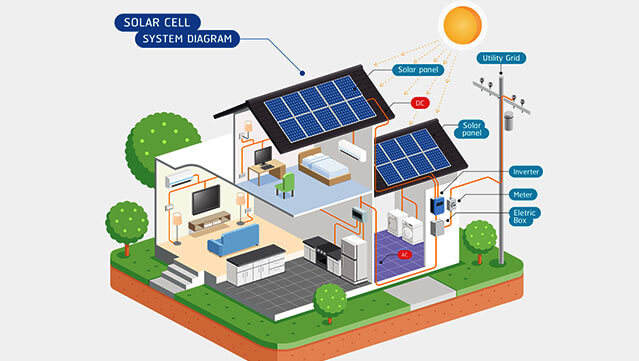The sun has produced energy for billions of years. We call this solar energy. Solar energy does not produce any pollutants and is one of the cleanest sources of renewable energy. It requires low maintenance and is easy to harness through solar photovoltaic technology (solar panels). As Middle East typically receives abundant exposure to the sun, companies in Middle East are in a unique position to positively reduce to their utility bills.
How do solar panels work?

Solar panels are made out of photovoltaic cells (which is why generating electricity with solar panels is also called solar PV) that convert the sun’s energy into electricity.
Photovoltaic cells are sandwiched between layers of semi-conducting materials such as silicone. Each layer has different electronic properties that energies when hit by photons from sunlight, creating an electric field. This is known as the photoelectric effect – and it’s this that creates the current needed to produce electricity
Solar panels generate a direct current of electricity. This is then passed through an inverter to convert it into an alternating current, which can then be funneled into the National Grid or used by the home or business the solar panels are attached to.
What are some of the advantages of solar power?
- Solar panels give you guaranteed power when the sun is shining – providing a consistent, stable form of generation throughout the day.
- Solar panels don’t need as much space as other renewable technologies and can be installed in a wide range of places. From larger, countryside solar farms that can support local biodiversity [2] by providing an undisturbed habitat for bees, butterflies and nesting birds, to rooftop panels in city centres that can help combat fuel poverty.
- After they’ve been installed, solar panels need little to no maintenance – just occasional cleaning to keep them clear of dirt and debris.
- Solar panels don’t create any noise pollution while generating electricity. This means that installations aren’t intrusive – whether they’re in crowded urban locations or quiet rural ones.
- Solar panels are very safe. They're mostly made from silicon sheets, and there's no danger of the photovoltaic cells leaking or emitting any toxins or fumes.



